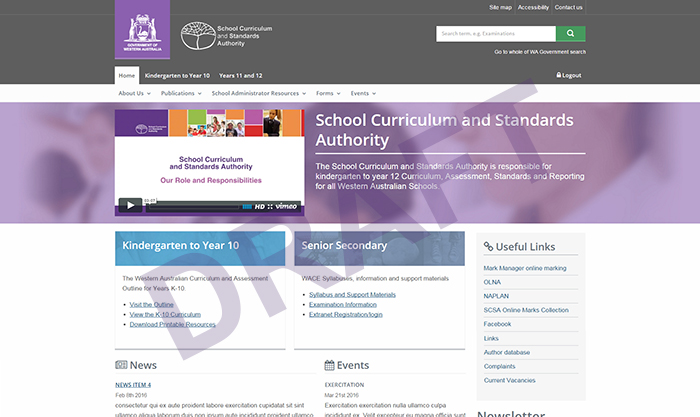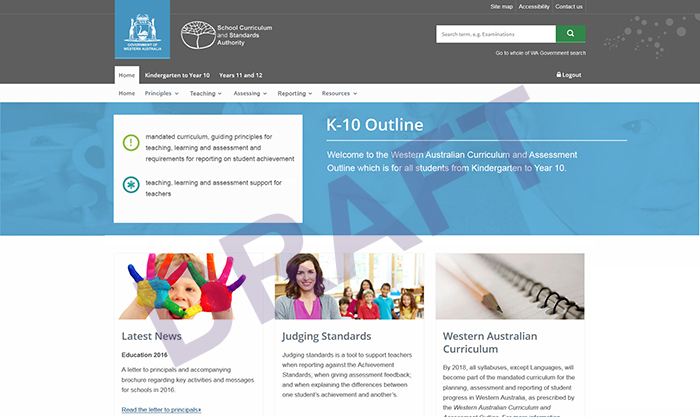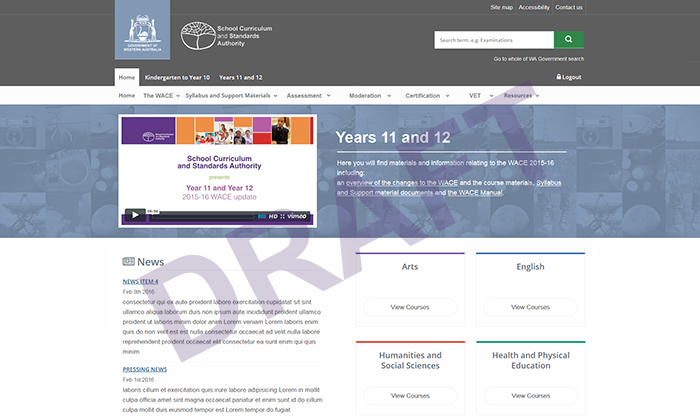General
Changes coming for Authority websites
Contact
Sarah Clough (08) 9273 6396
sarah.clough@scsa.wa.edu.au
Based on feedback from teachers and for the convenience of our users, the Authority is updating our web presence to improve navigation within and between Authority websites.
The Authority currently has three websites:
- the main Authority site: http://www.scsa.wa.edu.au (purple)
- the Western Australian Curriculum and Assessment Outline: http://k10outline.scsa.wa.edu.au (light blue)
- the WACE 2015-16: http://wace1516.scsa.wa.edu.au (dark blue).
Each site will be updated reflecting a number of changes:
- a new top level of navigation will be added allowing users to move easily between websites. A different feature colour will assist with website identification
- new search functionality will allow users to search across all three websites from the current location
- the main Authority website will be redesigned to reflect the look and feel of the K–10 and Years 11 and 12 websites
- year-specific content will be migrated from the main authority website to the K–10 and Years 11 and 12 websites
- navigation within the K–10 outline will be updated to reflect the 'Teaching, Assessing, Reporting' headings in the reporting policy
- the current WACE 2015–16 website will be renamed as the Years 11 and 12 website. The new URL for the Years 11 and 12 website will be available when it is launched. Users landing on the old site will be redirected automatically.
The graphics below illustrate the changes proposed to the top level page for each website:



A new extranet facility (secure area) is also being implemented for teachers to access additional support materials. Existing users will have an account in the new system and will use their email address to log in. Users will be asked to update their password the first time they log in to the new system.
The updated sites will go live prior to the beginning of Semester 2.
[print this article] [email this article]
Western Australian Curriculum and Assessment Outline K–10 – Update
Contact
Mandy Hudson (08) 9273 6755
mandy.hudson@scsa.wa.edu.au
Schools received a letter (dated 28 January 2016) from the Chair of the School Curriculum and Standards Authority, Patrick Garnett, and the Chief Executive Officer of the Authority, Allan Blagaich outlining updates to the Western Australian Curriculum and Assessment Outline. The Outline has been updated to include the revised Australian Curriculum (v8.1) for English, Mathematics and Science.
With regard to the revised curriculum, 2016 is a familiarisation year for schools. The updated curriculum is optional for schools in 2016. For schools using the 2015 version, this is available for download in PDF format from the Authority website at: http://k10outline.scsa.wa.edu.au. Schools may use this version in 2016. Full implementation of the revised curriculum is required in 2017.
Support materials which identify the changed or new content and the implications for teaching programs can be accessed via the Outline at: http://k10outline.scsa.wa.edu.au.
The v8.1 revised curriculum for History is not reflected in the Outline. History will remain as a single subject on the website until the end of 2016. The Authority has developed a coherent learning area for Humanities and Social Sciences with all four subjects: Civics and Citizenship, Economics and Business, Geography and History. Schools may choose to use the Humanities and Social Sciences syllabuses in 2016. The Humanities and Social Sciences curriculum will be fully implemented in 2017.
[print this article] [email this article]
Beginning to work with the new P–10 Arts Syllabuses
Contact
Mandy Hudson (08) 9273 6755
mandy.hudson@scsa.wa.edu.au
Within the Western Australian and Curriculum and Assessment Outline, The Arts is presented as a coherent learning area consisting of performance subjects (Dance, Drama and Music) and visual subjects (Media Arts and Visual Arts). These subjects provide students with the knowledge and skills to learn how to create, design, represent, communicate and share their imagined and conceptual ideas, emotions, observations and experiences, as they discover and interpret the world. The Learning Area Overview on the Ways of Teaching page contains a graphic that will assist teachers in planning their teaching and learning programs. The graphic may also provide a focus for teacher professional learning. The Ways of Teaching page can be found on the Authority website at the following address: http://k10outline.scsa.wa.edu.au/home/p-10-curriculum/curriculum-browser/the-arts/arts-overview/ways-of-teaching.
The Arts have the capacity to engage, inspire and enrich all students, exciting the imagination and encouraging them to reach their creative and expressive potential. The term 'creativity' plays a critical role in all arts subjects. The diagram included under Ways of teaching represents one way the creative process can be engaged with in The Arts.

Purpose
In this diagram, the creative process begins with a purpose that is informed by the focus of the creative task. The purpose is the challenge with which students are engaged in this creative process. The results of students' endeavours will be expected to reflect the purpose, in whatever form the results are expressed.
Preparation
Teachers will follow up the explanation of the purpose of the creative challenge with time for preparation. This may include appropriate opening questions, inquiry, exploration warm ups, creative stimuli, group processes, reminders of safe practices and other processes that get students ready for the lesson or series of lessons which are focused on the creative challenge's purpose.
Process and skills developmentConfident that the students are ready, the teacher is likely to spend time with students supporting the process of creative development as well as acquisition of knowledge and skills relevant to the creative activities. This may include working on strength, flexibility, breath control, techniques, values and conventions specific to the purpose and relevant to syllabus content for a particular year group.
This phase of the learning also includes time for students to play, experiment, shape, refine and focus their work, collaboratively and/or individually, towards the production of some outcome relevant to the creative challenge. The individual or group processes will include opportunities for teacher and peer feedback on individual or group progress.
FeedbackFormal opportunities are offered to get specific feedback about what is working and what would improve the impact of work completed to date. This formative assessment is critical to the development of creative thinking as well as planning for further knowledge and skills development.
SummativeThe creative process model acknowledges there are almost endless possibilities for the work to be reshaped and refined by an individual and group. However, there is some point in the learning process where the work is brought to a close and a final showcase is undertaken for feedback and further planning after that Summative phase. The Summative phase may include a showcase to peers, a submission of a final piece of work, display or broadcast of artistic endeavours or a presentation to an outside audience that shows the results of the individual or group's efforts.
Reflection and goal setting
Following the Summative phase and the provision of feedback by the teacher, peers or others, students may undertake a final reflective process where they consider what was effective and what they would do differently in the development and final presentation of their work. The critical reflective processes inform future creative processes in The Arts.
Teachers, imagination and reflective practicesIt is important to note that this creative process is non-linear, iterative and often requires the return to earlier phases of learning. Sometimes an idea is not working and a serious rethink is required. It should also be noted that the role of the teacher as support, facilitator, sounding board and guide is continuous and critical to all the processes identified in this diagram. The role of peers, reflective processes and imagination cannot also be overstated in any phase of this diagram.
Experiencing Live or Digital EventsThe Arts value the creative process for exploring particular challenges and can be informed through experiencing live or digital events in The Arts. The diagram below provides a series of general questions that may be used to help explore, plan, guide, enrich and connect with syllabus content live or digital arts events in Western Australia. These questions are not exhaustive and are not necessarily appropriate for every year group, subject or level of teaching and learning. Many arts organisations are providing education packs in support of live or digital events that can align more closely the themes and techniques of a particular event with the content of a particular arts syllabus in Western Australia. It should be noted that this diagram seeks to enrich arts education learning by experiencing arts events. The opportunities that digital arts offer can provide experiences for all schools and communities. Arts companies are constantly exploring ways to increase access to live arts events via tours and other forums.

The Arts syllabuses identify the kinds of flexible expectations live or digital arts events have of audiences. Some arts events expect audiences to be quiet and respectful observers; some events ask for input from the audience; other events interact more personally with the audience; and some events make the audience an active partner in the experience. Some arts events have strict rules about where audiences can be positioned and what they can touch; other arts events celebrate a more dynamic relationship between the piece and its viewer or observer. The Arts and broad opportunities to experience the arts will enrich students’ appreciation of the role of audience and the deeper experiences the variety of these experiences promise for them.
[print this article] [email this article]
Achievement Standards and Judging Standards Materials for Phases 2 and 3 Learning Areas
Contact
Mandy Hudson (08) 9273 6755
mandy.hudson@scsa.wa.edu.au
Achievement Standards and Judging Standards Materials for Phases 2 and 3 Learning Areas
During 2015 the Authority worked with teachers to develop the Achievement Standards and the Judging Standards materials for P–10 Humanities and Social Sciences and P–10 Health and Physical Education.
The Achievement Standards for these two learning areas can be found in the Western Australian Curriculum and Assessment Outline, under the year level syllabuses. There is a single Achievement Standard for Humanities and Social Sciences. For Health and Physical Education, there is one Achievement Standard for Health Education and one Achievement Standard for Physical Education.
The Judging Standards Materials, the Assessment Pointers and Annotated Student Work Samples, will be progressively uploaded during 2016.
The Authority is currently working with teachers to develop the Achievement Standards and the Judging Standards materials for P–10 Technologies – both Digital Technologies and Design and Technologies, and for P–10 Arts, including Dance, Drama, Media Arts, Music and Visual Arts. These will be progressively uploaded during 2016. Teachers will be notified through the K–10 Circular.
The Authority is currently working with teachers and schools across systems/sector to implement the assessment tasks developed in 2015 for the Languages learning area. These will be implemented during Term 2, 2016, to enable the standards development work to commence in Semester 2.
[print this article] [email this article]
P–10 Alternative Curriculum Recognition Process
Contact
Vanessa Peters (08) 9273 6779
vanessa.peters@scsa.wa.edu.au
The Western Australian Curriculum and Assessment Outline sets out the knowledge, understanding, skills, values and attitudes that students are expected to acquire and guidelines for the assessment and reporting of student achievement.
Application by schools and education providers for recognition of an alternative curriculum (and/or reporting on student achievement) that aligns with the Western Australian Curriculum and Assessment Outline should be made to the Authority, using the following templates:
- Nationally Recognised Curriculum Template
- Notice of Intention Template – information to present for a notice of intention
- Submission Template – information to present for a submission for assessment.
These procedures and templates, accessible via the Western Australian Curriculum and Assessment Outline, at:http://k10outline.scsa.wa.edu.au/home/p-10-curriculum/alternative-curriculum-recognition, provide organisations with a framework of questions to be addressed with supportive documentation so that the Recognition Review Panel, reporting to the Authority, can make this assessment.
The timeline setting out key dates for the 2016 Alternative Curriculum Recognition process, along with detailed information about the process, is also available in the Outline.
[print this article] [email this article]
2016 Key messages – school leader briefings
Contact
Vanessa Peters (08) 9273 6779
vanessa.peters@scsa.wa.edu.au
Secondary school principals and deputy principals are invited to register to attend a briefing about the School Curriculum and Standards Authority’s 2016 Key Messages.
The briefings will be organised to provide updates on the Western Australian Curriculum and Assessment Outline for Years 7 - 10 and the WACE 2016.
The briefings will be presented across the State, in February and March, by the Authority’s Chief Executive Officer, Allan Blagaich and senior members of his executive team.
Primary school principals and deputy principals briefings will occur in Term 2. Notification of dates, venues and registration processes will be provided by the end of Term 1.
Register for the current briefings via our website:http://www.scsa.wa.edu.au/internet/Events_and_Forms/Events/2016_briefings.
[print this article] [email this article]
Recording of enrolment and achievement of VET units of competency (delivered through VET credit transfer)/VET qualifications – Year 8 and Year 9 students, 2016
Contact
Kerry Tarrant (08) 9273 6770
kerry.tarrant@scsa.wa.edu.au
Permission must be obtained from the School Curriculum and Standards Authority for Year 8 and/or 9 students to enrol and have achievements in VET units of competency (achieved through VET credit transfer)/VET qualifications contribute towards the Western Australian Certificate of Education.
Schools should apply only if the studies for these students are part of a longer term program where:
- students are in remote community schools where learning programs relate directly to the local industry, or
- students are accessing VET as part of an individual education program (IEP), or
- a valid opportunity has been presented which supports an ongoing and coherent training pathway.
An application form for permission of recording of enrolment and achievement of VET units of competency (delivered through VET credit transfer)/VET qualifications – Year 8 and Year 9 students, 2016 is available on the Authority website at: http://www.scsa.wa.edu.au/internet/Events_and_Forms/Application_Order_Forms.
The completed application form must be returned to the Authority by Thursday, 24 March 2016.
[print this article] [email this article]
Application to study Year 12 ATAR Units 3 and 4 and sit the 2016 ATAR course examinations for students in Year 10
Contact
Kerry Tarrant (08) 9273 6770
kerry.tarrant@scsa.wa.edu.au
Permission must be obtained from the School Curriculum and Standards Authority for a student who is in Year 10 to study a pair of Year 12 ATAR units (Units 3 and 4) and sit the 2016 ATAR course examinations.
A student who sits an examination for a particular Year 12 ATAR course in Year 10 must be exiting the course and will not be permitted to enrol in the Year 12 ATAR course (Units 3 and 4) and sit the ATAR course examination in Year 12.
An application form for permission to sit an examination for students in Year 10 is available on the Authority website at:
http://www.scsa.wa.edu.au/internet/Events_and_Forms/Application_Order_Forms.
Applications close Wednesday, 6 April 2016. No changes will be made to student enrolments to study a pair of Year 12 ATAR units (Units 3 and 4) and sit the 2016 ATAR course examinations after this date.
Please note: Applications for students in Year 11 to study ATAR units (Units 3 and 4) and sit the 2016 ATAR course examination are no longer required.
